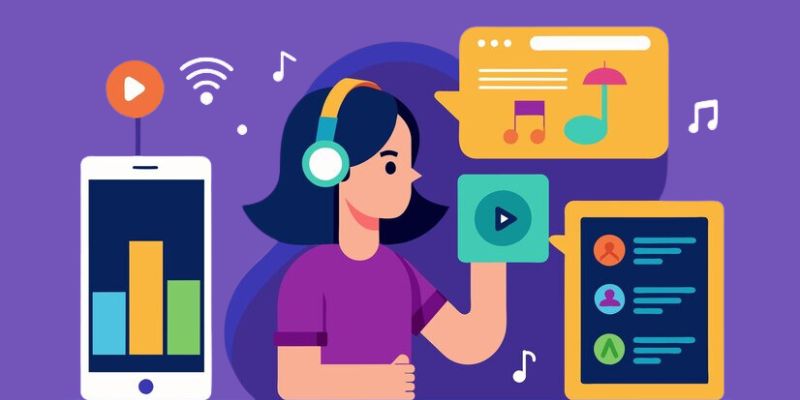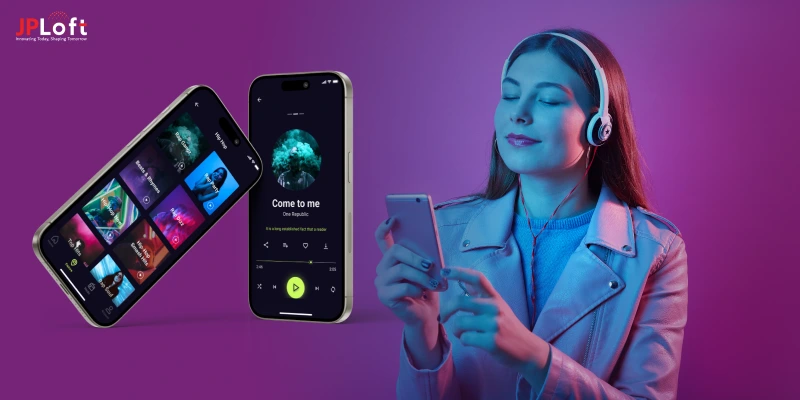Music streaming app development services have revolutionized how we can access and listen to music by providing vast catalogs of music available on demand. However, for streaming services to be sustainable and legal, they must follow strict copyright and security standards. This means protecting users' data and obtaining the proper licenses for streaming content, monitoring unauthorized uploads, limiting access to subscribers who pay, tracking streams to ensure exact royalty payments, and quickly responding to concerns raised by rights owners.
Technology plays a significant role in compliance; it also relies on licensing agreements, business collaborations, and the education of users. This blog will discuss the ways Music streaming applications can safeguard information provided by users and only recognize legally licensed content. It also discusses ideas concerning appropriately compensating rights holders and artists to provide a safe service for the listener and an equitable ecosystem for creators.
The need for compliance with copyright Laws in the Music Industry
Copyright laws are crucial to protecting the rights of songwriters, artists, record labels, and all those involved in the creation of music. If copyright laws were not properly enforced, the music industry would not be able to function effectively and efficiently.
Copyright grants creators of content sole rights over their work. This means they control how their music is distributed and used and who makes a profit from it. Copyright holders decide whether they want to grant their music rights to others.
Protects From Unauthorized Access
The unauthorized use of music that is copyrighted is a violation of the law. It deprives musicians and rights owners of the money they are entitled to. A widespread copyright violation could severely reduce the motivation of people to develop new music. This could hinder creativity over the long term.
Role of Copyright Compliance in Music Creation
A strict copyright compliance policy is required to ensure that those who invest time, money, and effort into creating music are adequately paid. Musicians, composers, label owners, distributors, and labels depend on revenue from legitimate use for their work. Without this income, the ecosystem of mobile app developers is affected.
Strategies and Tools in Music Licensing and Digital Rights Management
Many laws and organizations are working to enforce copyright laws and fight piracy. Music licensing organizations manage collective rights and pay royalties to members. Tools like digital rights management can also restrict the use of music tracks that are illegal.
Securing User Data and Privacy
Privacy and data protection must be the top priority for any mobile or online application. Customers trust companies with their personal data, such as passwords, financial information, password messages, and other private information. It is vital that businesses secure these data to maintain this trust.
Businesses should adhere to security best practices, such as encrypting sensitive data in transit and at rest. They must also regularly conduct security audits and utilize tools to identify vulnerabilities. Users' passwords should be saved using secure hash functions, and two-factor authentication could provide an additional layer of protection.
A live music streaming app development firm must only collect the bare minimum of required data from users. They must be clear about the type of data collected, what it is used for and with whom they share it. Users should be able to control their data via settings and the option to request the deletion of data.
Users' data must be protected from unwanted threats by hackers and internal threats posed by employees. Policies should govern how employees manage sensitive user data. Physical security measures are also helpful to secure the data stored on mobile application development servers and devices.
In the case of a data breach, the company is required to notify affected users promptly. They must also detail how to prevent further incidents and minimize the potential impact.
Read About: Online Music Streaming App Development: Features and Cost
Requirements to Stream Music Online

In order to stream online music and reproduce the tracks in particular formats, the streaming platforms need to pay a cost and a fee to mechanical licensing authorities like Harry Fox to secure the license. While this license isn't considered to be unlimited it ,is deemed to be necessary for all streaming companies to have this license for their territory to be able to operate. In simple terminology, it is paying a fee to the music producer every time a user streams the track. There are other licenses these platforms must purchase, like recording licenses from record labels and performance licenses, which is an amount of royalty paid to the person who owns the music.
Music streaming apps like Spotify, Tidal, Apple Music, and Amazon Music have always worked to fight IP infringement by implementing and refining various tracking methods to spot possible abuse or misuse of the platform which could result in an illegal or illegal streaming of songs. They have also imposed limitations on music remixes because they may result in copyright infringement on artists' renditions. Although they have put in place measures to combat music piracy, much hasn't been accomplished in this area because music makers are hesitant to get involved in legal disputes, particularly because they feel that their work is not well-known or valued by the general public.
Also Read: In-Depth Guide on How to Create a Music Streaming App in 2024
Anti-Piracy Measures for Music Streaming Applications
Music streaming apps employ various measures to stop illicit music piracy and safeguard copyrighted content—anti-piracy measures to ensure compliance, security, and long-term income streams for the music industry.
Content identification systems are utilized to verify the authenticity of the streamed and uploaded audio to confirm that the music is licensed properly. Any tracks that are not matched or illegal are restricted from streaming. Digital rights management technology restricts access to streams only to paid, authorized users of the service. For example, DRM governs what users can do with the streamed content by limiting downloading.
A strict set of terms and conditions ensures that the sharing of logins and passwords and ripping streaming, and redistributing content are illegal. Repeat violators face account suspensions or even terminations. Music streaming apps track the user's activity to identify suspicious patterns that could indicate piracy. This could include unusually long streaming times massiveand downloads, and streams coming from strange areas.
Rights Holders have the option to report illegal usage of their songs, so streaming music apps can examine and block infringing content. The purpose of education on piracy is to educate users on why the payment to rights owners and artists depends on legal streams provided by authorized services.
Ensuring Secure Payment Systems
Music streaming apps should have secured payment systems that can manage user subscriptions and one-time payments. This increases customer trust and loyalty. The most important elements of a secure system for payment for streaming music streaming apps are:
Encryption is a must. The information about payment details provided by the user must be protected during storage and transmission. This helps protect sensitive data such as credit card numbers from being stolen or unauthorized use.
Compliant to PCI DSS
Streaming Music applications should be compliant by Payment Card Industry Data Security Standard (PCI DSS).This establishes standards of security for handling storage, transmitting, and storing customers' payment information. Fraud prevention tools that identify and block fraudulent transactions reduce the possibility of chargebacks and disputes over payments. Technologies such as 3D Secure and CVV codes offer additional security.
Reduce data storage
Music streaming app development solutions do not store unnecessary data about payment. They must store only the essential information (last four digits of the number, name, etc.). So no one can find out the personal information.
Monitoring for threats
Continuously checking for phishing attacks, malware, and other threats can help ensure that payment systems are secure. Regular system updates are crucial.
Plan for incident response
Streaming applications should have a strategy for the eventuality of a data breach. This involves alerting customers, working with banks, and mitigating fraud risks.
Must Read: How To Develop Music Streaming App From Scratch
What Is The Process To Obtain A License For Streaming Music?
To get a license to stream music, the streaming service has to speak directly to the owners of copyright rights for the music they wish to stream. The copyright owners could be songwriters as individuals as well as record labels or proprietors of publishing firms for music. The streaming service needs to negotiate a license agreement with the copyright holder and might be required to pay royalty fees to use the music. After a license agreement is in place, streaming services will then be allowed to to stream the music according with the specifics stipulated in the license.
To determine the copyright rights owner, find the song's information on a copyright site like The US Copyright Office or UK Copyright Service. Contact Blokur, the Harry Fox Agency, MusicReports (INC), Crunch Digital, or Blokur. Sometimes, for a single region launch, there may be a single copyright agency in your nation.
What is in the license agreement between the streaming service and the copyright holder determines how music can be utilized for streaming services.
Read Also: Music Streaming App Development With Major Benefits 2024
Future Trends and Challenges
While the music streaming app development industry grows as it does, copyright and security will be a major concern. Innovations in technology and new business models will influence the future development of music streaming apps. The technology for identifying content will be improved by using machine learning and AI. They will better identify all variations of tracks in real time.
Blockchain technology can be utilized to track music streams securely and to facilitate the payment of royalties. This can improve the transparency of music streaming. The new DRM standards can allow interoperability across various music streaming app development platforms while limiting unauthorized use.
Licensing structures may change to account for various streaming tiers and business models, such as ad-supported services. Educational initiatives will target younger consumers who have become more social online and have less stricter attitudes toward copyright.
However, there will be challenges regarding preventing intentional infringement via user uploads, ensuring licensing covers the latest music streaming app development models and technologies, and balancing compliance and security costs. Legal disputes in the midst of disagreements of opinion between rights owners and streamers will also require resolution.
Cross-Platform Music Streaming App Development company has the solution of all compliance rules and regulation of music apps.
Conclusion
Music streaming app development services have changed our experience of music, so it's essential to be aware of the privacy of data. The handling and collection of data from users by these platforms create legitimate concerns, like data sharing by third parties and breaches, in addition to the requirement for permission and oversight. It is the obligation of both the users and the platforms to prioritize the privacy of data and work to ensure a safe as well as more secure environment to enjoy music online. Hire Music Streaming App Developers that looks out for security and Copyright Compliance laws while creating music applications.











